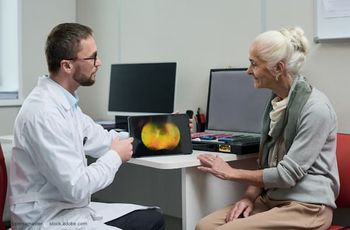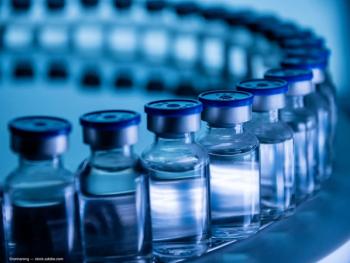
Isopropyl nitrate poppers pose maculopathy risk
Poppers containing isopropyl nitrate may cause foveal maculopathy, researchers say.
Poppers containing isopropyl nitrate may cause foveal maculopathy, researchers say.
A series of patients presented to Sussex Eye Hospital in Brighton, UK, with visual impairment after inhaling poppers, wrote Dr Rebecca Rewbury, from the hospital's ophthalmology department, in the British Journal of Ophthalmology (
Poppers consist of volatile aromatic nitrates, typically in colourless liquids. They cause vasodilation and were originally developed for the treatment of angina.
Side effects include reduced blood pressure; headache; flushing; tachycardia; dizziness; and involuntary muscle relaxation, including of vaginal muscles and the sphincter.
But they also cause transient euphoria and sexual arousal, making them popular as party drugs. They caught on first among homosexual men, and 60% of gay men in Australia reported having tied them.
Their popularity has since spread among heterosexual people. About 1.1% of the general population in the UK uses poppers at least once a year, making them the fourth most popular recreational drug after cannabis, cocaine and ecstasy.
The 1968 Medicine Act made poppers illegal to sell for human consumption, but they are available in the guise of household products such as air fresheners.
In the past two decades, 12 deaths have been attributed to alkyl nitrites in the UK. In 2006, legislation reclassified isobutyl nitrate as a class II carcinogen. Consequently, isopropyl nitrite has replaced this ingredient in poppers, but it is unclear whether the change makes poppers any less toxic.
Because they do not act on the central nervous system, poppers were exempted from the 2016 Psychoactive Substances Act, which otherwise prohibits most drugs intended to cause a psychoactive effect.
Patients
The 12 patients who presented to the Sussex Eye Hospital were all men and ranged in age from 31 to 59 years. Four were HIV positive, with their infections controlled through antiretroviral medication. Two had used poppers for the first time, three were occasional users and four were regular users.
The ocular symptoms the patients most frequently reported were blurriness or scotoma of the central vision. The onset occurred within hours or days of the popper use.
In all cases, the anterior segment and intraocular pressures appeared normal. But yellow foveal deposits appeared on fundoscopy. And these spots corresponded to a subtle area of hyperfluorescence in the four patients who had fundus autofluorescence.
In all the patients, spectral domain optical coherence tomography (SD-OCT) showed characteristic disruption of the inner segment/outer segment (IS/OS) junction in the subfoveal region, with varying amounts of retinal elevation. These findings were unilateral in two patients.
The researchers analysed contents of eight products: Platinum, Hard-on Rush, Berlin XXX hardcore, Liquid Gold, Jungle Juice (yellow label) and Jungle Juice Plus (silver label).
Proton nuclear magnetic resonance (1H NMR) spectra results for six of the products were almost identical and showed an approximate 50:50 mixture of isopropyl nitrite and isopropyl alcohol.
Nitrites easily convert to their corresponding alcohols in the presence of water. A common household product, isopropyl alcohol can cause headache, dizziness and drowsiness.
Jungle Juice
Results were different for two of the samples of Jungle Juice Plus. One was a mixture of compounds tentatively identified as having amyl, 2-methyl butyl and isobutyl structure, but the nitrite functional group was absent as confirmed by Raman spectroscopy.
The other sample of Jungle Juice Plus contained nitrite and was identified as a mixture of amyl nitrite, 2-methyl butyl nitrite and the corresponding alcohols.
Three patients said they had used poppers for at least 20 years but only noticed symptoms when they switched brands. One of them noticed the symptoms after a binge of Jungle Juice containing isopropyl nitrite in which he inhaled about every 5 minutes for a half hour.
Though isobutyl alcohol is not illegal in the UK, “its detection is concerning, given that isobutyl nitrite is a banned carcinogen and a potential source of isobutyl alcohol”, Dr Rewbury and her colleagues wrote.
Another patient reported using other brands without visual symptoms, then switching to Berlin XXX, which contains isopropyl nitrite. A third patient did not experience any visual side effects when he used isobutyl nitrites in the 1980s, but after a binge in which he inhaled Amsterdam poppers about every 5-10 minutes for 5 hours, he developed a central scotoma.
Symptoms and abnormalities mostly improved over time. After abstaining from poppers for 6 months after diagnosis, six patients were asymptomatic within a few months, with improvements in measured visual acuity. Abnormalities on optical coherence tomography (OCT) also improved gradually but were still present in some cases after symptoms resolved.
One patient continued to use poppers, but switched to another brand. His symptoms continued for five months but resolved after a year. Another patient experienced an improvement when he stopped using poppers, but lost visual acuity and had changes visible on OCT when he started again.
“The cases presented here suggest that certain brands of poppers may be more toxic to the retina than others, with users anecdotally identifying a link between specific brands and the onset of their visual symptoms,” Dr Rewbury and colleagues concluded.
“Chemical analysis of the products tested suggests that isopropyl nitrite is responsible for poppers' maculopathy, although the mechanism of this is unknown.”
Newsletter
Keep your retina practice on the forefront—subscribe for expert analysis and emerging trends in retinal disease management.




























